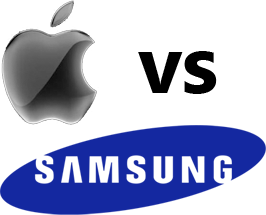Apple vs Samsung: The Big Reveals
posted Saturday Aug 4, 2012 by Scott Ertz

We knew that when the judge said hundreds of thousands of documents would have to be made public during the Apple vs Samsung mutual patent suit that we would get the opportunity to learn a lot about how both companies work. We also knew that we would get to learn about a lot of products that both companies had abandoned before market. What we didn't know was that we would be talking about cars and a purple building this week.
The "Purple Building" was the top-secret location of the top-secret "Project Purple," which became the primary object of this case, the iPhone. The reason for the ridiculous title was because no one within the company was allowed to know this was going on right under their noses. In fact, even people being hired into the company were not allowed to know why they were being hired. In fact, the only information they received was that they would be giving up nights and weekends for a few years. That was made more comfortable by the dorm-like construction of the "Purple Building."
Scott Forstall, software engineer for Apple, said about the project,
I never directed anyone to go and copy anything from Samsung. We wanted to build something great... and so there was no reason to look at something they'd done.
Of course, the original iPhone looked strikingly similar to a series of handsets from HTC, the PPC series, and the operating system, now known as iOS, looks amazingly identical to that of an early Sony MP3 player. I guess that does indicate they were never directed to steal from Samsung. To be fair, however, both of those operating systems look almost identical to Windows 3.0, but it's because it was a decent design, made more appropriate on the smaller screen. Also, how many ways can you differentiate a black rectangle with a button and a speaker?
The object of the case was not the only interesting information, however. Hit the break to find out how cars factor into this trial.
After the success of the iPod, Apple started to believe it could be successful as something other than a computer company. That was a good move, considering they hadn't managed to be successful as a computer company at all. In an effort to support this idea, employees suggested markets that the company could get into. One that seemed to be taken seriously for a while was an Apple-branded car. They also considered getting back into the digital camera business, which they had failed pretty miserably at with the QuickTake.
In addition to markets they knew they shouldn't be in, they have also been considering a 7" iPad. Eddy Cue, head of iTunes, said,
I believe there will be a 7" market and we should do one. I expressed this to (CEO) Steve (Jobs) several times since Thanksgiving and he seemed very receptive the last time.
Now, Jobs had been very vocal about his aversion to the idea of a 7" tablet, saying that it was not a sustainable market. He also said the same thing about netbooks before releasing the MacBook Air and about music devices before releasing the iPod. This certainly was a trend for the late co-founder and CEO of the company, to insult a product category before entering that category himself. For some of us, this is a sign that he had fully embraced the idea of a 7" iPad, and for others an indication that he would not be happy to know the company was probably a few months from releasing one now.
All-in-all this week has been enlightening on the subject of Apple's business practices and internal struggles. Hopefully when Apple takes the reigns of the trial, we will get some interesting information about abandoned projects at Samsung as well.

